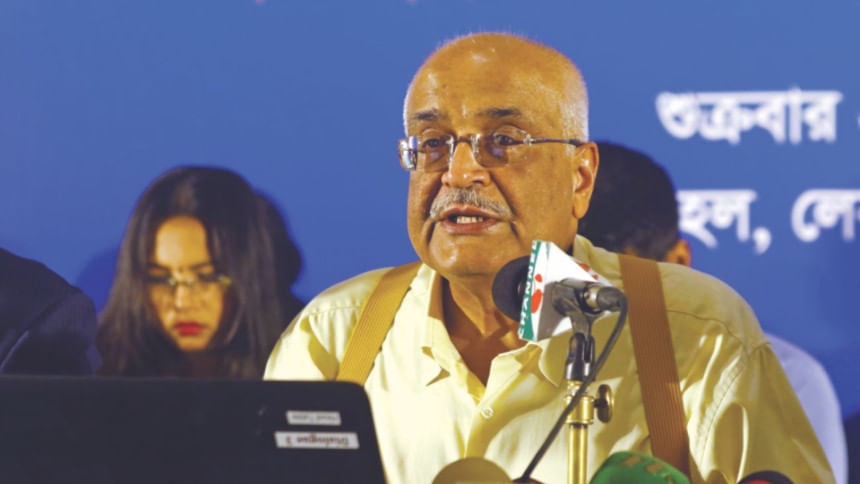Fresh taxes may fuel inflation: CPD

“Cost of business and living will go up that will affect middle class and lower middle class.”
Debapriya Bhattacharya
Distinguished fellow, CPD
The proposed taxes for fiscal 2017-18 might fuel inflation and deal a blow to investment and economic growth, the Centre for Policy Dialogue said yesterday.
“The cost of doing business and living will go up, which will affect the middle-class and the lower middle-class,” said Debapriya Bhattacharya, distinguished fellow of the CPD.
The government resorted to the easiest ways to boost its revenue collection, such as raising the levies on bank accounts and air tickets, and in so doing, continued to create pressure on honest taxpayers, he said.
Debapriya's comments came at a press briefing to present the think-tank's analysis on the proposed budget for the upcoming fiscal year.
The CPD criticised the allocation of Tk 2,000 crore to shore up state banks' capital base, as the performance of most of the lenders did not improve despite injection of funds for the last several years.
Terming the situation in state banks “unexposed bankruptcy”, Debapriya said public money was being used to make up for the losses inflicted by loan defaulters.
“He [finance minister] kept mum on the troubled banking sector. Was it because of the powerful quarters in the sector?”
The think-tank's observations came a day after Finance Minister AMA Muhith proposed a 26 percent bigger budget of Tk 400,266 crore for fiscal 2017-18 compared with the outgoing fiscal year.
Debapriya said the finance minister proposed raising the government's expenditure by a whopping 26 percent without giving any clear outline of how the implementing agencies, with their existing capacity, would efficiently manage the higher allocation.
Although the CPD didn't disagree with the government's expectations and aspirations, it expressed doubt about the methods for executing the proposed budget.
Debapriya said the budgetary structure creates a financial illusion as the reality does not match the figures used to frame it.
“Most surprising is the deficit financing part. It appears that a huge spiral in foreign financing was shown to match the figures,” he said, citing an 80 percent growth projection of gross foreign aid flow in fiscal 2017-18.
The finance ministry showed that $7.6 billion of foreign aid would fly into the country in the next fiscal year, which would be a record.
Bangladesh managed to utilise foreign aid of $2.7 billion at most in a fiscal year, which was in fiscal 2015-16.
Noting the allocations in various sectors, the CPD said the provisions for agriculture and allied sectors are higher than the outgoing fiscal year's, but their share in the total budget is contracting over time.
Debapriya also said the allocations for education and health sectors were still low in terms of the country's gross domestic product.
On tax measures, the think-tank said the tax-exempted threshold, which has been kept unchanged at Tk 2.5 lakh, is relatively lower in Bangladesh.
“There is scope to raise this,” it said, while citing the tax-free income ceiling in India, which is Rs 2.5 lakh -- equal to about Tk 3.13 lakh.
The CPD also believes the minimum tax rate should be reduced to 7.5 percent instead of 10 percent to encourage more people to pay taxes. The income tax on the first slab is 5 percent in India and 4 percent in Sri Lanka.
The civil society body said no clear implementation plan to enforce the new VAT law was given in the budget proposal and neither an assessment of the additional revenue generation from its implementation from July 1 was made public.
“Effective implementation of the act will be uncertain and challenging,” the think-tank said.
CPD Distinguished Fellow Mustafizur Rahman said the government gave a big concession by way of exempting many goods and services from VAT to reduce the pressure on people.
The list of items for supplementary duty was not changed amid demands from businesses to protect domestic industries.
“But primarily we think that prices will rise,” he said, adding that it cannot be said that the measures have been framed to gain popularity.
“There are some areas where there is a tax burden,” Mustafizur added.
The CPD said VAT would be imposed at a uniform rate on the supply of gas and electricity.
CPD Research Fellow Towfiqul Islam Khan said the NBR advised the Power Division not to increase the prices of electricity and to claim rebate after imposing 15 percent VAT.
But it appears that the government may need to increase subsidy if the retail prices are not increased.
“The government's policy decision is unclear in this regard,” he said.
The CPD said a number of targets -- such as the 7.4 percent GDP growth and the 5.5 percent inflation goals -- set by the government for next fiscal year were tenuous, while the aim to increase the foreign aid flow would be “impossible to attain”.
Private investment of some Tk 66,000 crore and public investment of nearly Tk 50,000 crore will be required in fiscal 2017-18 to achieve the targeted growth.
The CPD, however, said economic growth does not become meaningful unless enough jobs are created and the unemployment rate brought down.
Citing the Labour Force Survey, it said 4.7 lakh people got jobs per year between 2013 and 2016, down from 13.3 lakh between 2010 and 2013.
During 2006-2010, 16.8 lakh people got employment annually.
Net employment in the manufacturing sector has fallen 9 percent. The decline in female labour force was 11 lakh at a time when the manufacturing sector posted 11 percent average growth during 2013-2016, the CPD said.
Debapriya said the decline in manufacturing sector jobs indicates the changes in the investment scenario.
“It needs to be investigated where jobs are being created and what types of jobs are those. It appears that the economy is going through a big change,” he added.
Fahmida Khatun, executive director, and Khondaker Golam Moazzem, research director of CPD, also spoke.

 For all latest news, follow The Daily Star's Google News channel.
For all latest news, follow The Daily Star's Google News channel. 



Comments